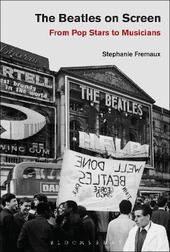
|
The Beatles on Screen: From Pop Stars to Musicians
Paperback / softback
Main Details
| Title |
The Beatles on Screen: From Pop Stars to Musicians
|
| Authors and Contributors |
By (author) Stephanie Fremaux
|
| Physical Properties |
| Format:Paperback / softback | | Pages:184 | | Dimensions(mm): Height 229,Width 152 |
|
| Category/Genre | Film guides and reviews
Rock and Pop |
|---|
| ISBN/Barcode |
9781501374203
|
| Classifications | Dewey:791 |
|---|
| Audience | | Tertiary Education (US: College) | |
|---|
|
Publishing Details |
| Publisher |
Bloomsbury Publishing Plc
|
| Imprint |
Bloomsbury Academic USA
|
| Publication Date |
29 October 2020 |
| Publication Country |
United States
|
Description
The 1960s ushered in a time of creative freedom and idealism reflected in the popular music and films on both sides of the Atlantic. At the forefront of driving that creative change were four mop-topped musicians from Liverpool, The Beatles. While many scholars have examined their role as songwriters, as countercultural and political figures, and as solo artists, few have considered the important role film played in The Beatles' career. This book focuses on the overlooked films the Beatles performed in from 1964 to 1970 in order to chart their journey from pop stars to musicians. Through these case studies, The Beatles on Screen uncovers how the relationship between film and pop music has changed the ways in which bands communicate with their fans.
Author Biography
Stephanie Fremaux is Lecturer in the School of Media at Birmingham City University, UK. She leads the Media Section's Erasmus and Internationalization agendas, including leading master classes at a partner university in Kazakhstan. Her research interests are primarily focused around interdisciplinary film and popular music including studying the relationships between popular music on film and modes of performance; popular music tourism; fandom and the use of digital platforms; and Beatles scholarly research.
ReviewsThe Beatles have been the focus of copious amounts of popular music scholarship but very little attention has been paid to their feature and promotional films, particularly in terms of considering the films as a complete cycle. Fremaux's book addresses this gap by highlighting how film was used by the Beatles to communicate with their fans, navigate the tide of popularity and construct the Beatles' authenticity. By adopting an interdisciplinary approach, Fremaux's analysis of the Beatles' films adds new insights into "the Beatles' story". * Sarah Baker, Professor of Cultural Sociology, Griffith University, Australia *
|